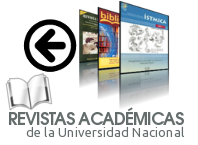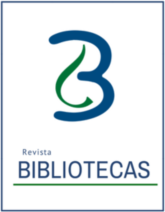Integración de tecnología y pedagogía en la Biblioteca Infantil “Miriam Álvarez Brenes” de la Universidad Nacional
Keywords:
Libraries, Information Technology and Communication, Methodologies, Learning EnvironmentsAbstract
The time has now come to demand something very different in the various libraries of the UNA. "Learning to live, learning to learn" is a way of acquiring new knowledge over a lifetime, learning to think freely and critically, learning to love the world and make it more human and learning to be fulfilled through work, is the idea that led to reflect on the important role that libraries play in the learning process. In this context, it should be emphasized that technology is essential for the literacy of the library user population and that library professionals as mediators between information and users should prepare responsibly and enjoy these changes and possibilities. This research work is based on the implementation of a methodology that aims to enable users to access information and knowledge in a more agile, friendly and interactive way in ICT-enriched learning environments. This methodology has been designed for a children's library, but due to its applicability it can be used in any type of library, both inside and outside the National University.
References
Acuña, A.L. (2000). Diseño de ambientes de aprendizaje para el desarrollo del pensamiento. II Congreso Internacional de la Universidad Interamericana de Costa Rica. San José, C.R. : [s.e.].
Anfossi, A. (2000). La informática educativa y los programas oficiales de estudio. San José, C.R. : [s.e.].
Aportes de la tecnologia en la educacion. (2008). Disponible en: http://www.educando.edu.do/educanblog
Benito, F. (2000). La alfabetización en información en centros de primaria y secundaria. [s.l.] : [s.e.]
Biblioteca en tecnologías apropiadas. (1986). Disponible en: http://www.tecnologiasapropiadas.com.
Campal, M.F. (2003). Los telecentros y las bibliotecas públicas: nuevas alianzas para la sociedad de la información. Disponible en: http://www.anabad.org/archivo. 2003.
Casasbueas, J. (2004). Centros Comunitarios Multipropósito – CCM: International Development Research. Disponible en: http://web.idcr.ca/fr/ev-54733-201-DO_TOPIC.html
Coll, M. (1999). El constructivismo en el aula. Barcelona : Editorial Craó.
Córdoba, J.A., Sanz, P. (2004). España en la Sociedad de la Información. Disponible en: http://www.absysnet.com. Abril, 2004.
Dierkingis L. (1999). Seminario: la innovación educativa en el aprendizaje informal. San José, C.R. : [s.e.].
Federación Internacional de Bibliotecas y Asociaciones de Bibliotecarios (2002). Manifiesto sobre Internet, proclamada por la IFLA. Disponible en: http://funredes.org/mistica/castellano/emec/produccion/memoria7/0309.html
Fuchs, R. (2004). Telecentros, tecnología al alcance de todos. Disponible en: http://www.unesco.org/courier/2000_03/sp
López, C. (2000). Modelo para el desarrollo de bibliotecas digitales especializadas. Disponible en: http://www.bibliodgsca.unam.mx
Martínez, D. (2005). El Centro de Recursos para el Aprendizaje CRAI. El nuevo modelo de biblioteca universitaria Disponible en: http://www.aab.es/pdfs/gtbu_crai.pdf. 2005.
Pautas sobre los servicios de las bibliotecas públicas. (2003). Madrid : Ministerio de Educación, Cultura y Deporte, Subdirección General de Información y Publicaciones. Disponible en: documentos/pautas_servicios.pdfhttp://travesia.mcu.es
Pozo, J. (1993). Teorías cognitivas del aprendizaje. España: Ediciones MORATA.
Programa de Informática Educativa MEP-FOD (2000). El ambiente de aprendizaje informatizado. San José, C.R. : [s.e.].
Trilnick, C. (2007). Experiencias de aprendizaje en entornos de convergencia digital. Disponible en: http://portal.educ.ar/noticias/entrevistas/carlos-trilnick-experiencias
Downloads
Published
How to Cite
Issue
Section
License
Bibliotecas provide immediate open access to their content, based on the principle of facilitating research to the public free of charge and free of charge to promote the global exchange of knowledge.
The journal Bibliotecas is a publication hosted by a public higher education institution, which is supported by public resources. Since its inception, the magazine has offered all its contents free of charge without any restriction on the rights of: reading, downloading and printing in full text. Works published in libraries may be analyzed, quoted and reproduced in whole or in part, mentioning the original source.
The journal Bibliotecas is licensed under the Creative Commons Attribution - Non-Commercial - Share Equal, 4.0 International license; therefore, it is allowed to: share, copy and redistribute the material in any medium or format.

Este obra está bajo una licencia Creative Commons Atribución-NoComercial-CompartirIgual 4.0 Internacional.








